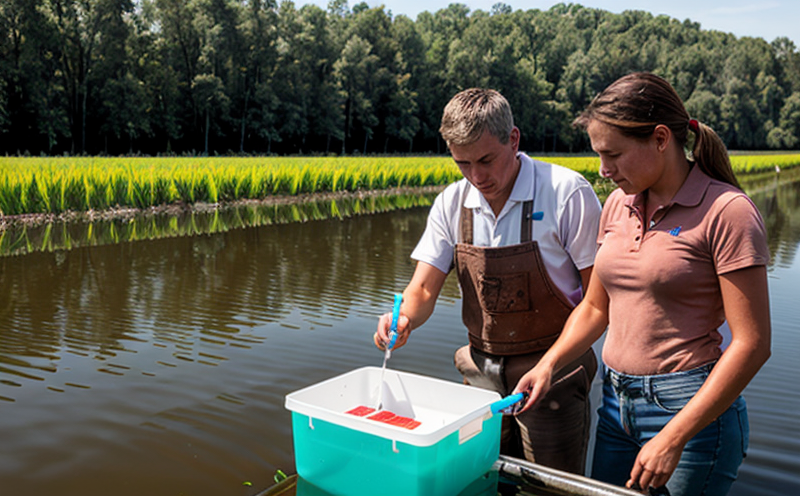Aluminum Content Testing in Agricultural Water
The testing of aluminum content in agricultural water is crucial for ensuring that crops and livestock are not exposed to potentially harmful levels. Aluminum, a common element found naturally in soil and water, can be detrimental when present in excessive amounts. In agriculture, the presence of aluminum can affect crop health, soil structure, and ultimately, yield. This service ensures compliance with international standards while providing valuable insights into water quality.
Aluminum content testing typically involves the use of spectrophotometric methods or ion chromatography techniques to measure the concentration levels accurately. The test is conducted on representative samples collected from various locations within a farm or irrigation system, ensuring that the results are reflective of the overall water quality conditions.
The importance of this service cannot be overstated in today’s regulatory environment. Regulatory bodies such as EC, US EPA, and WHO have set guidelines to ensure that water used for agriculture is safe and does not contain harmful levels of aluminum.
Our laboratory uses state-of-the-art equipment, including inductively coupled plasma mass spectrometry (ICP-MS) which provides high sensitivity and accuracy. This allows us to detect even trace amounts of aluminum, ensuring precision in our results. The testing process involves the following steps:
- Sample collection: Representative samples are collected from different parts of the agricultural field or irrigation system.
- Preparation: Samples are prepared according to standard protocols to ensure consistency and accuracy.
- Analysis: Using advanced instrumentation, aluminum content is measured with precision.
- Reporting: Detailed reports are generated which include data analysis, compliance verification, and recommendations for corrective actions if necessary.
The testing results not only help in meeting regulatory requirements but also provide valuable information to quality managers and R&D engineers about the water quality affecting their operations. This knowledge can be used to optimize irrigation practices, enhance crop yields, and protect soil health.
Aluminum content testing is essential for ensuring that agricultural practices are sustainable and environmentally friendly. By adhering to international standards such as ISO 7879:2016, we provide accurate and reliable data which can be used in decision-making processes related to water management and crop production.
Applied Standards
The testing of aluminum content in agricultural water is governed by several international standards that ensure accuracy, consistency, and reliability. The most commonly referenced standards include:
- ISO 7879:2016 - Determination of aluminum in natural waters.
- ASTM D3534 - Test methods for determination of aluminum in water by flame photometer.
- EN 16228:2017 - Determination of aluminium in drinking water by inductively coupled plasma mass spectrometry (ICP-MS).
- WHO Guidelines on aluminum in drinking water.
By adhering to these standards, we ensure that our testing methods are consistent with the best practices and regulatory requirements. This provides clients with confidence that their test results are accurate and can be relied upon for decision-making purposes.
Why Choose This Test
- Compliance Assurance: Ensure compliance with international standards such as ISO, ASTM, EN, and WHO guidelines to avoid regulatory penalties.
- Precision Measurement: Our advanced instrumentation allows for the detection of even trace amounts of aluminum in water samples.
- Representative Sampling: We collect representative samples from various parts of your agricultural field or irrigation system to ensure accurate results.
- Expertise and Experience: With years of experience, our team is adept at handling complex samples and delivering reliable test results.
- Detailed Reporting: Comprehensive reports are generated which include data analysis, compliance verification, and recommendations for corrective actions if necessary.
- Environmental Impact Assessment: By monitoring aluminum content in agricultural water, we help minimize environmental impact by providing actionable insights to protect soil health and enhance crop yields.
The precision and reliability of our testing services are unmatched. Our commitment to quality ensures that you receive accurate results that can be trusted for decision-making purposes. Choose us for your aluminum content testing needs in agricultural water, and take the first step towards sustainable agriculture practices.
Quality and Reliability Assurance
The reliability of our testing services is paramount to ensuring that you receive accurate and consistent results. At our laboratory, we maintain a high level of quality assurance through stringent internal controls and regular calibration of instruments.
We follow ISO/IEC 17025:2017 accreditation standards which require us to have the necessary technical expertise, equipment, facilities, and management systems in place to ensure that our testing services meet or exceed industry expectations. This includes:
- Regular calibration of all instruments used for aluminum content testing.
- Training and certification of laboratory staff to perform tests accurately and consistently.
- Use of internationally recognized standards such as ISO, ASTM, EN, and WHO guidelines.
- Strict adherence to standard operating procedures (SOPs) to ensure consistency in sample preparation and analysis.
We also maintain a quality management system that is continuously reviewed and improved. This ensures that our services are reliable and consistent over time. Our commitment to quality is reflected in the trust placed in us by leading agricultural companies, research institutions, and regulatory bodies around the world.





